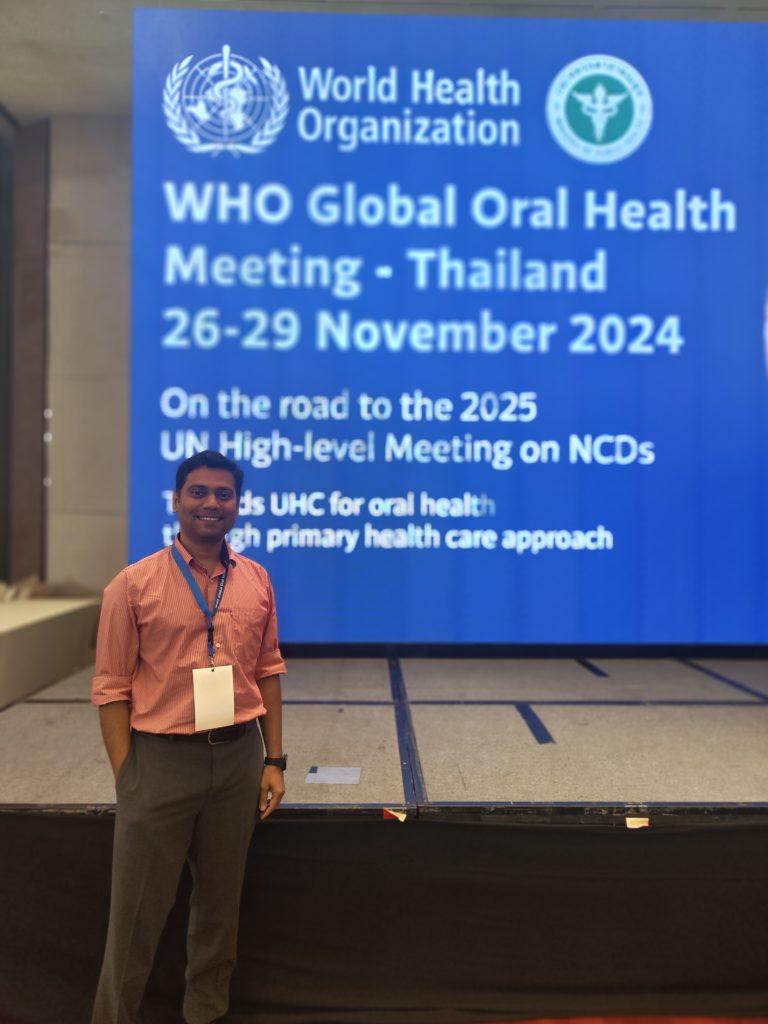
Oral health remains underfunded and under-prioritised globally, as it is often perceived as secondary to other health issues. Many health systems focus heavily on curative services, ignoring prevention and health promotion. This imbalance is particularly concerning in Low- and Middle-Income Countries (LMICs), where preventive approaches could significantly reduce the burden of oral diseases.
End of November 2024, I attended the first-ever Global Oral Health Meeting (GOHM) in Bangkok as a non-state actor. Organised by WHO and (sub-)themed “Universal health coverage for oral health by 2030”, the meeting was a unique opportunity to engage with global health leaders, policymakers, and other stakeholders in shaping the future of oral health. In general, the Bangkok event was a critical step in addressing the long-standing neglect of oral health in global health agendas. Yet, it also exposed gaps in governance, inclusivity, and accountability.
Achievements – A milestone for Oral Health Advocacy
Without any question, the Bangkok meeting marked an important milestone for oral health advocacy. By convening diverse stakeholders such as WHO Regional Directors, Health Ministers, Chief Dental Officers, government representatives of over 110 countries, and Non-state Actors (NSA) such as academics and non-governmental organisations, WHO also demonstrated a renewed commitment to integrating oral health into broader health systems. Many of the discussions stressed how oral health is deeply intertwined with Universal Health Coverage (UHC). Other discussions showed that addressing oral health inequities in LMICs also requires confronting social determinants such as poverty & education. A major highlight was also the emphasis on global health diplomacy in tackling oral health inequities.
The development of the Bangkok Declaration aimed at guiding global and national oral health policies, and released during the closing plenary, was another step forward. It provides a roadmap for countries to prioritise oral health and integrate it into health systems.
Challenges: Governance, Accountability, and Inclusivity
Although it sets the stage for future action, the Bangkok Declaration also has some limitations that warrant critical examination. Oral health research agendas are not adequately prioritised within the national health agenda, particularly in resource-constrained settings. Without evidence-driven policymaking, addressing oral health challenges risks inefficiency and ineffectiveness. In addition, the Bangkok Declaration is nonbinding and lacks enforcement mechanisms. Without accountability frameworks, the onus falls entirely on individual countries to act. For many LMICs facing financial and resource constraints, the feasibility of implementing the declaration’s recommendations remains questionable.
Another missed opportunity was the limited engagement of the NSA in developing the national oral health roadmaps. While including academics and other non-governmental stakeholders in the overall meeting was no doubt a step forward, the process could have been far more participatory. The exclusivity of discussions between member state delegates and the WHO reflected an elitist approach that excluded critical voices, particularly civil society. NSA bring invaluable grassroots insights, evidence, and community-driven solutions, and their meaningful involvement is essential for shaping inclusive and effective policies. Not just on oral health, by the way.
Opportunities: Building Coalitions and Driving Integration
The current gaps in terms of governance, inclusivity and accountability can be tackled though, at least to some extent. While the Bangkok Declaration is nonbinding, countries can voluntarily develop mechanisms to track progress and share best practices. Non-state actors and civil society can also act as watchdogs, ensuring transparency and accountability. Future global oral health meetings should thus prioritise inclusivity. Engaging the NSA in meaningful dialogue with member state delegates will lead to more representative and effective outcomes.
Promising in that respect was the creation of the Global Coalition on Oral Health at the meeting. The Coalition is intended as “WHO convened a forum that aims to continue the momentum and advance collective efforts towards the implementation of the Global Oral Health Action Plan 2023-2030 in countries through knowledge sharing, collaboration and unified advocacy”. NSA will also be involved in this Coalition. They can indeed play a key role in closing research gaps and standardising oral health metrics, among others.
Looking Ahead: Sustaining Momentum
All in all, the WHO GOHM was a step in the right direction. The meeting reiterated that to make oral health a priority, it must be embedded within UHC and other health system strengthening initiatives. This integration will not only enhance access to care but also improve efficiency by leveraging existing health infrastructure. The Bangkok meeting provided, however, also a timely reminder of how much work remains to be done. Oral health governance, workforce distribution, and research all remain critical challenges, and without stronger accountability mechanisms, global progress may turn out uneven.
Yet, I prefer to stress the many opportunities here, as they are equally significant. By building coalitions, integrating oral health into broader health policies, and fostering inclusive dialogue, the global health community can ensure that oral health becomes a cornerstone of health equity efforts. Continued advocacy on oral health through platforms like the Public Oral Health Forum Africa and NCD Alliance, among others, can create momentum for greater political commitment and resource allocation.
As global health academics and researchers, we must continue to advocate, innovate, and hold systems accountable. The Bangkok meeting may have ended, but the journey to prioritise oral health has just begun. Back in 2021, a resolution on oral health passed at the World Health Assembly put oral health on the global health agenda – long overdue. The Bangkok meeting signifies a ‘coming of age’ moment for oral health. Now we need to sustain the momentum.
It’s time for a transformative change indeed. Or as the Bangkok declaration puts it, “No Health without Oral Health”.
